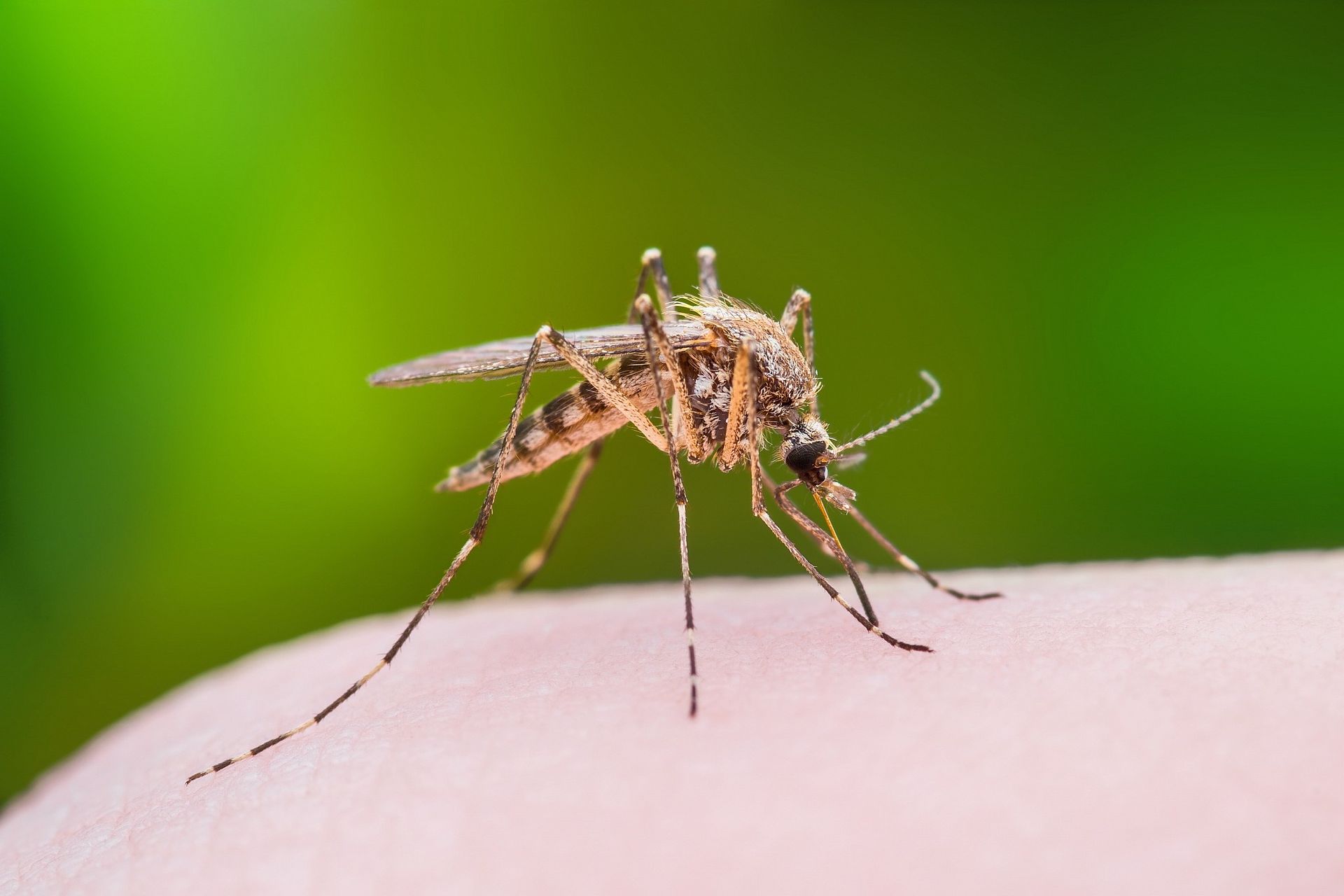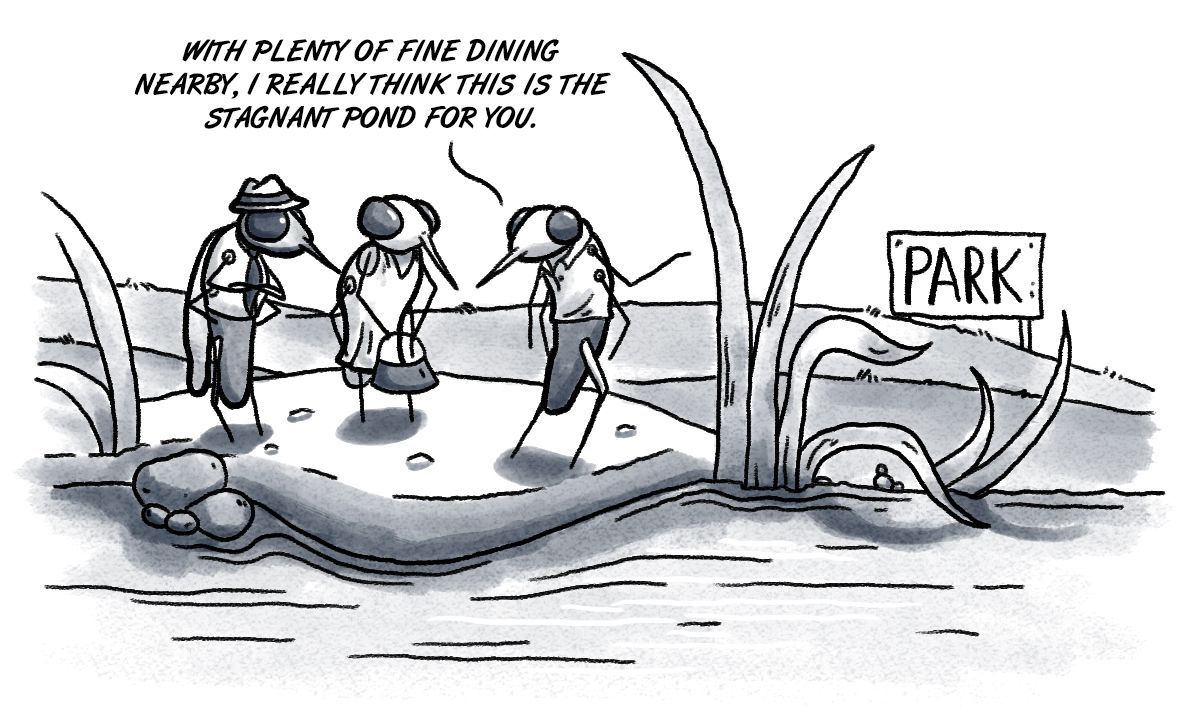Mosquito Season Is Here
News Staff • June 21, 2023
Heavy rains can increase the amount of these insects

There is an old joke about the island having wild turkeys in years past until the mosquitoes were seen carrying them away. While that tale is far-fetched, the amount of these pesky insects can increase with heavy rains and standing waters.
In recent weeks the Gulf Shores community has experienced a deluge of rain, which will leave standing water and mosquito breeding places in many locations. While these pest can cause itchy bites, they can also cause more serious health issues like spreading diseases. The most common diseases that could potentially be carried by mosquitoes include: West Nile, Eastern Equine Encephalitis, Saint Louis encephalitis virus, and dog/cat heartworm.
It’s a common misconception that mosquitoes suck blood for food. Mosquitoes ingest blood to nourish their bodies so they can lay and hatch healthy eggs. According to the Center for Disease Control (CDC), mosquitoes can lay 100 eggs at a time, so populations of this pest can get out of control quickly. When eliminating mosquitoes, it’s key to use multiple methods, to kill mosquitoes at every stage of the life cycle.
It’s also important to note that repelling and killing mosquitoes aren’t the same thing. Repelling mosquitoes will keep them away from you by making you less attractive to them. They’re attracted to the carbon dioxide from our breath and elements of our sweat. Mosquitoes are also attracted to standing water, laying eggs in areas such as birdbaths, damp potting soil, standing water in ditches, yards, puddles, and more.
Here are the top ways to repel mosquitoes that have already entered your home.
- Bug zappers: Safe for the indoors, bug zappers can kill mosquitoes on contact and are a good solution if you are only facing a few stray bugs.
- Candles: Burning lavender candles is a natural mosquito repellent that keeps mosquitoes away while making your home smell pleasant.
- Chemical repellents: Applying traditional chemical mosquito repellent spray will keep these pests from biting you. You should purchase products that contain 30% to 50% DEET. The Environmental Protection Agency (EPA) has found that DEET continues to meet safety standards when used properly.
- Coffee grounds: Burn some coffee grounds in a coffee tray or egg carton and the smoke will repel these pests. Do this carefully in an area where it won’t cause damage or set off a fire alarm.
- Essential oils: These may not be as effective as traditional pesticides. Mix a few drops of lavender, lemon, or eucalyptus with one cup of water, pour it into a spray bottle, and shake. Be sure to patch test your oil first, and consult with a medical professional if you have questions.
- Mosquito traps: There are several ways you can get a mosquito trap—order one online, buy one from the grocery store or hardware store, or even make your own with sugar water and yeast.
- Oscillating fans: Mosquitoes can’t fly well against the wind. Turn your fan on and watch the mosquitoes scatter and ultimately give up.
- Outdoor soap: Some outdoor soaps are specially designed to repel mosquitoes. After bathing with 100% natural, non-toxic soap such as Skin Armour Deep Woods Outdoor soap, the scent of your sweat will repel mosquitoes.
- Sealing your space: To prevent mosquitoes from entering your home, patch any holes, tears, or gaps in screens and doors. If you can see sunlight in the space around your door, that means it isn’t properly sealed. There’s an easy fix—purchase a simple door strip.
The Best Way to Get Rid of Mosquitoes in Your Yard
The most effective methods to get rid of mosquitoes outdoors include these:
- Attracting natural predators
- Burning candles
- Cedar mulch
- Eliminating standing water
- Manicuring your lawn
- Mosquito traps
- Outdoor chemical repellents
- Planting natural deterrents
- Treating pools and ponds
- Yellow LED lighting
Set a Mosquito Trap
Mosquito traps are a handy way to control your mosquito population. These traps work by mimicking the visual and smell stimuli that attract mosquitoes to humans.
There are many varieties of mosquito traps out there. Some work by trapping mosquitoes to a sticky surface, while others electrocute them with an electric grid. The Mosquito Magnet is one of the most popular traps—it works by vacuuming mosquitoes up.
For this method, place your traps in a shady area. You may have to move them around to find the optimal placement for ensnaring mosquitoes. It’s worth noting that different species of mosquitoes react differently to traps, so it’s not a one-size-fits-all remedy.
Eliminate Standing Water
Female mosquitoes lay their eggs in standing water, and that’s where their larvae hatch. Empty all stagnant bodies of water you can, like any water that’s pooled in buckets, gutters, ditches, and pet bowls. Make sure to refresh the water in any birdbaths and check to see if your potted plants have enough drainage.
Treat Pools and Ponds
For standing water that you can’t eliminate, apply a larvicide dunk or liquid larvicide and run the filter regularly. To prevent mosquitoes from laying eggs in your pool, be sure to cover the pool at night and during the months when you aren’t using it.
Burn Candles
Citronella candles are a long-time fan favorite for repelling mosquitoes. You can buy sizable ones to place around your yard and ensure mosquitoes will keep their distance.
Keep a Manicured Lawn
Mosquitoes like to rest and settle in areas that are cool, damp, and dark. Manicure your lawn, trim trees and shrubs, and make sure your grass isn’t too tall. This will make your yard less hospitable to mosquitoes.
Plant Natural Deterrents
Repelling mosquitoes doesn’t have to be just practical—it can be pretty, too. Planting natural deterrents can spruce up your garden while keeping these prevalent pests away. Consider planting the following flora to keep mosquitoes away:
- Basil
- Catnip
- Citronella
- Garlic
- Geraniums
- Lavender
- Lemon balm
- Lemongrass
- Marigolds
- Pennyroyal
- Peppermint
- Rosemary
- Sage
- Tulsi
Put Down Cedar Mulch
Cedar oil is a common mosquito repellent ingredient, and you can easily find cedar mulch for your lawn or garden. Cedar mulch soaks up excess moisture, keeping it in the soil and deterring mosquitoes from settling in your vegetation.
Attract Natural Predators
Predators can’t completely eradicate your issue if you’re overrun with mosquitoes, but if you’re just getting a few unwanted critters here and there, attracting them is worth a shot.
Many birds are natural mosquito predators, including purple martins, waterfowl, swallows, and migratory songbirds. Setting up bird feeders is a solid step in attracting these birds. Installing a bat house can also help. Bats eat up mosquitoes, but you may not want to attract bats near your home.
Use Yellow LED lighting
Mosquitoes are attracted to the light from traditional light bulbs. Warm, yellow LED lights are less appealing to them.

Recent Posts

























